Ramit Sethi is a personal finance advisor and entrepreneurial mentor, who wrote the New York Times Bestseller “I Will Teach You to Be Rich.” We asked him about what aspiring entrepreneurs should consider when thinking about starting a business.
What’s your advice to small businesses looking for their brand’s purpose?
Forget about it. The last time you ordered takeout, did you stop to think about the restaurant’s “brand purpose?” No, you were hungry. The last time you got your oil changed, did you look up your mechanic’s website to find the brand purpose? No, you just wanted to get out of there in 15 minutes.
So many entrepreneurs are misled by prognosticators and consultants, who encourage them to sit down in a conference room with whiteboards and sketch out their “brand purpose” for weeks on end. This is a waste of time. You’d be better served speaking to 15 prospects, asking them what their real problems are and what a magical solution would be, then creating something to help them.
A successful business is simple. You’ll know it when you create something valuable and your customers are delighted to pay.
What would you say to an aspiring entrepreneur who is hesitant to take the risk of starting their own business?
Maybe a business isn’t right for you. Lots of people have good jobs where they’re valued, paid well, and get to contribute to something bigger than themselves.
In our community, we have thousands of aspiring entrepreneurs who are on the cusp of starting a business. The most common reason they don’t is “I don’t have an idea.” The second most common reason is “I don’t have time.” Finally, “I don’t know where to start.”
All of these can be overcome. We teach a process to find an idea, set the time aside, and follow a step-by-step process to turn an idea into a profitable business.
Looking back 10 years from now, ask yourself: Will you regret not giving this a shot? If the answer is yes, it could be a good time to start a business now.
What qualities do successful entrepreneurs have in common?
Entrepreneurs are diverse. They’re Black, white, Asian, Hispanic; old and young; men and women; technical and non-technical; extroverts and introverts; decisive and uncertain. There is no credential for being an entrepreneur — if you decide to be one, you are an entrepreneur.
The one quality I’ve seen in myself and other entrepreneurs is an unwillingness to take the default route in life. Entrepreneurs look at a business and say, “Why do they do that?” They make certain unconventional decisions, whether about their lifestyle, finances, or health. They have an idea about the way things should be, and there are clues in their everyday lives.
Beyond money, what do you see as a measure of a successful business?
You can tell a business is successful when it’s profitable, it has a strong point of view differentiating it from competition, and has customers who love and trust the product.

